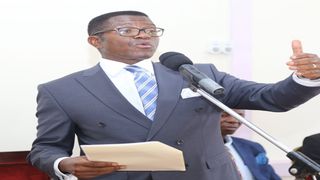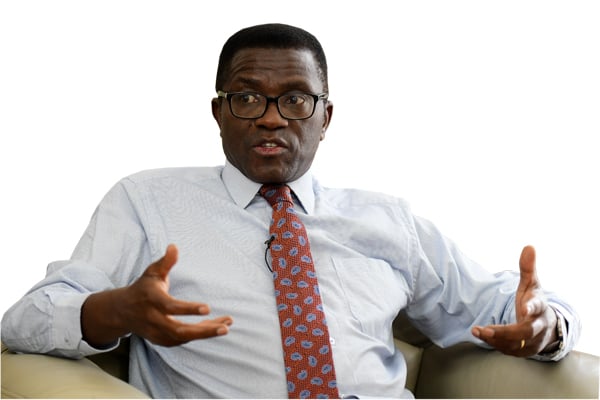
Katikkiro Charles Peter Mayiga opens a Buganda youth retreat in Masaka District on May 17. PHOTO/BUGANDA KINGDOM
|Special Reports
Prime
Mayiga finds foot in values to move Buganda forward
What you need to know:
- On May 12, the lawyer and businessman marked nine years as the premier of Buganda, Uganda’s most populous kingdom.
Mr Charles Peter Mayiga’s term as Buganda Katikkiro (prime minister) has upset many and altered interests, but it is likely to go down in history as one of the most transformative of Kabaka Ronald Muwenda Mutebi’s reign.
On May 12, the lawyer and businessman marked nine years as the premier of Buganda, Uganda’s most populous and powerful kingdom.
Mr Mayiga is the 5th Katikkiro to serve Kabaka Mutebi after he replaced Eng John Baptist Walusimbi.
In his maiden address as Katikkiro, Mr Mayiga outlined a four-point agenda for his tenure: ensuring integrity, restoring Kasubi tombs burnt in March 2010, completing the commercial Masengere plaza and introducing new work ethics.
He lurched on integrity as a means to preserve and protect the heritage and throne of the kingdom, helping in the process to inspire younger generations, to many of whom ancestry is alien, to pick interest in Buganda culture and practices.
“With the integrity we have tried to popularise our culture and heritage within the kingdom and this has been appreciated even with the young generation, people within Buganda region and those who are not Baganda today,” he said.
To popularise the cultural seat, the Katikkiro arranged a visit by the Kabaka to all counties within his kingdom.
“We have 56 clans in Buganda and they all have their specific [significance and totems],” Mr Mayiga said.
During the cleaning up of the Kabaka’s Lake in 1992, each clan was assigned a slot to erect their own statue. These stand today, symbolising the prestige of each clan.
“This set of heritage and culture [campaign] is still going on and I am not saying that those who were Katikkiro before [me] did not do anything, they did and those who will come after me will also start from there,” he said
Safeguarding integrity, he argued, also encompasses supporting the royal family, clans and the kingdom administration headed by the Katikkiro.
Despite the Katikkiro’s focus on integrity, his regime hasn’t run without blemish.
Blemishes
Kingdom officials and subjects have, either directly or through proxies, questioned the accountability for the monies collected from within and outside the country to rebuild the Kasubi tombs.
Despite the work nearing completion, disapprovals have echoed about the inordinate delay to finishing the reconstruction, which Mr Mayiga said is a result of the necessity to have specific materials, rituals and clans to execute particular project phases.
The tombs are the burial ground for Buganda’s deceased kings.
“People have no idea on what it takes to build the tombs…,” he said.
Whereas Mr Mayiga scoffed at critics, he went ahead to disband and reconstitute the tombs restoration team, appointing kingdom minister Kaddu Kiberu as chair, deputised by Jolly Lutaaya, who died on December 8 last year.
Before Lutaaya’s passing, the Katikkiro – like his critics – acknowledged that a lot of progress was made under the substitute committee in rebuilding the royal mausoleum.
“I do not know if the public is aware how costly it is to restore the tombs; we have so far spent in excess of Shs6b to date,” said Mr Mayiga.
He added: “We are now in the final stages; we have embarked on working in the interior and the thatching, which is at 99 percent complete, and that stage of the interior is traditionally supposed to be done by the Ngeye clan and the royals have roles to play depending on the stage we have reached.”
It is not only the Kasubi tombs project that has exposed Mr Mayiga to scrutiny. For instance, his highly-billed land registration project, christened kyapa mungalo, under which Bibanja holders on Kabaka’s land were encouraged, in some cases required, to obtain a leasehold.
Bibanja holders paid Shs100,000 each to obtain a certificate from Buganda Land Board, and arm of the kingdom. Some Baganda questioned the initiative and why they needed to pay for their native land, likening it to exploitation.
However, that was not the biggest headwind. Presenting itself as a body corporate to issue land documents placed Mengo, the administrative seat, as a substitute and on collision with government.
In Uganda, land administration and titling are vested in the Ministry of Lands or subordinate entities such as the city and district land boards.
It was not long before the government branded Mengo’s Kyapa Mungalo as illegal in a fight that drew in President Museveni, and afterwards the more acerbic-tongued State Lands minister Sam Mayanja, both of whom have publicly asked that Mailo land tenure (on which BLB issued titles) be abolished.
Clash over kyapa mungalo
President Museveni has called Mailo “evil”. However, it is not only government officials displeased with Mengo over land matters. For instance, businessman Hamis Kiggundu, himself a Muganda, is locked in a bitter fight with BLB, which he alleges is being used by thieves hiding behind the Kabaka to defraud ordinary Baganda, over a prime land in Kigo in Wakiso District.
BLB officials have denied any wrong doing, and counter-accused Mr Kiggundu of being a fraudster.
Whereas Katikkiro Mayiga can chest-thump for keeping Buganda largely out of more turbulent political fall-out with the government, such as the 2009 Buganda riots, neither he nor the kingdom is out of the woods.
A more likely flash point is the issue of land. The government-constituted Commission of Inquiry into Land Matters that Justice Catherine Bamugemereire chaired, to the chagrin of Mengo, recommended that Mailo land tenure, one of four land holding systems provided in the Constitution, be abolished. The Commission findings have not been publicly debated whether in Parliament.
However, land law reform is among a raft planned changes highlighted in the legislative agenda for the second session of the 11th Parliament, potentially setting Buganda Kingdom and the central government on a path of clash.
Mr Mayiga discusses much less of the internecine issues with government in his report card.
Masengere plaza
Rather, he passionately spoke about the completion of the Masengere, a commercial plaza in Bulange billed as a sustainable cash cow for Mengo.
It houses the kingdom’s key companies; Buganda Land Board, the Central Broadcasting Services (CBS) FM radio and BBS Terefayina television. There are also other tenants occupying it, and paying Buganda kingdom.
Mr Mayiga, among others, attributed the feat to improved work ethic under the Enkola ey’ómulembe omujja initiative he pioneered. It encompasses innovativeness, transparency and working with passion.
READ MORE
“Under those categories of priorities, we set ourselves to start working professionally, we have been re-organising the Kabaka’s civil service ensuring that we have competent people to fill the different positions, drafting different policies and manuals and other things which include setting up internal audit offices called Kalondoozi,” he said.
The purpose: honesty and frugality.
In addition, Mengo has Majestic Brands as a new outfit to burnish its image and connect it to investors and partners. “If you want transparency, get systems in place and my job as the Katikkiro is to ensure that the systems are followed and my colleagues’ work is to ensure that systems are followed,” he said, adding, “when you violate the systems, then you get issues of corruption.”
He is aware no one from outside will come to develop Buganda Kingdom. That responsibility is for mainly its subjects, and leaders
[email protected]




